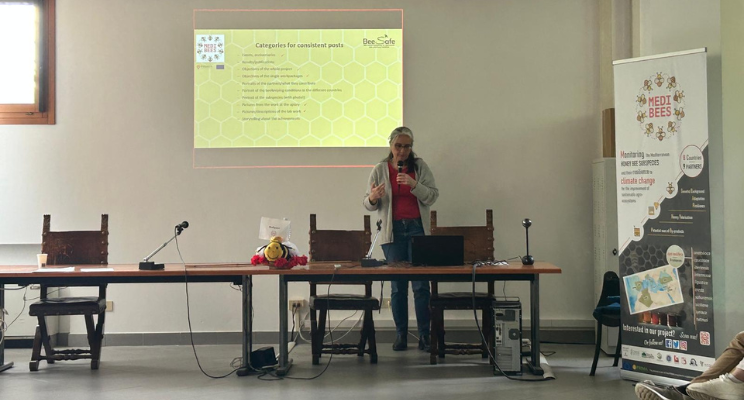One of the difficulties of research is to show the connection to peoples’ everyday life. That’s why I’ve made communicating bee science one of the three pillars of BeeSafe. Bee health also relies on evidence based recommendations for beekeepers, training of vets, and information for a broader audience. After all, the claim “save the bees!” is only possible if we know what we’re doing. And what bees need. So, as a new addition to BeeSafe’s consulting services, scicomm makes a new entrance.
In larger research projects, one of the working packages is “dissemination”. Especially if it’s applied science and the project is meant to include stakeholders. Which is often the case when it comes to bees and beekeeping. On the other hand, doing consistent social media posts, writing blogs, or making videos takes time and creativity. So, in many cases, a social media agency is hired. Which does an excellent job very often. But sometimes… You get photos from hoverflies instead of bees. The text isn’t really accurate or other issues.
This is where BeeSafe comes in: I’m used to communicating bee science. I do this all the time. In my blog, in my social media posts, in the talks and courses I give. I’m now offering this to large research projects, too.
How BeeSafe helps in communicating bee science
To be clear: I’m not a copywriter, I communicate science. So, this service is open only to research projects and non-profit organisations. When I talk about treating varroa with oxalic acid and why, for instance, I won’t be singing the praise of a single product. I’ll explain the how, when, and why of the treatment. Why it’s important to treat with registered products. The latter may be the only reason to mention products – but all of them. And, obviously, this service is also limited to bees – that’s the area of my expertise.
Let me give you an example: At the moment, I’m doing the social media posts for MEDIBEES, an international project that aims to develop sustainable beekeeping in the Mediterranean in times of climate change. What I’m doing for them:
- set up profiles on Facebook, Instagram, and LinkedIn
- I do posts three times a week about the project on these channels and general “explainers” on honey bee biology
- the posts are adapted to beekeepers – the main audience of this project
- I answer comments
- there’s continuous exchange with the partners of the project to make sure that I get photos and info about the ongoing work.
Options of working with BeeSafe in bee science communication
In MEDIBEES, I’m acting as a subcontractor for the social media activities. But I’m also available for collaborating as internal partner in the respective work package. I could also take the role of double checking the content an agency produces for accuracy. My tone is usually quite sober, if you like it more “excited” this may be an option. For international projects, it may also be interesting that I speak five languages. Four of them in continuous use, also in professional context: Spanish, German, English, and Italian. My French got a bit rusty, but nothing I couldn’t reactivate. As a scientist, I know that some things shouldn’t get onto social media before they’re published.
In addition to social media posts, I could also write blog posts or articles in beekeeping magazines to give your project more visibility. Or help you in editing booklets, summaries for policy makers, or whatever other communication pieces you’re thinking of. Let’s talk about this!
Talks, trainings, and courses
Obviously, I’m still doing my own bee science communication. The BeeSafe Academy is a quite new entry to this. It will fill up with different courses, ebooks, and other materials to help you learn about bee health.
Then, I still do what I did as a PhD student: talks and trainings. Now with a background of 30 years in the area. Also here, my knowledge of different languages comes in handy. But obviously, if there’s a translation, I also do this for areas of the world with languages I don’t know. Like in Bulgaria recently.
My topics are on all aspects of bee health:
- varroa, varroa, varroa (still highly needed!)
- neglected honey bee diseases
- the importance of biodiversity for bee health
- challenges for sustainable beekeeping
- animal welfare applied to honey bees
- etc.
Talks and trainings are possible both online and in real life. Just contact me and we’ll figure out the best solution for your association, school, or company.

